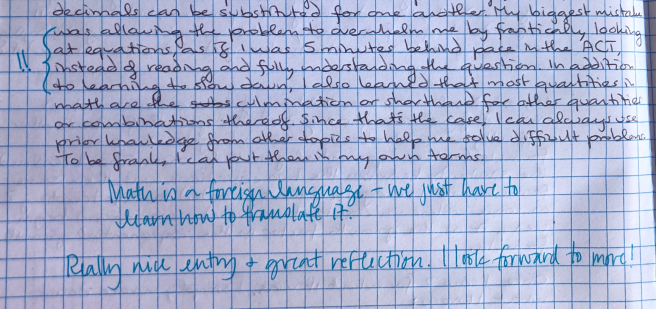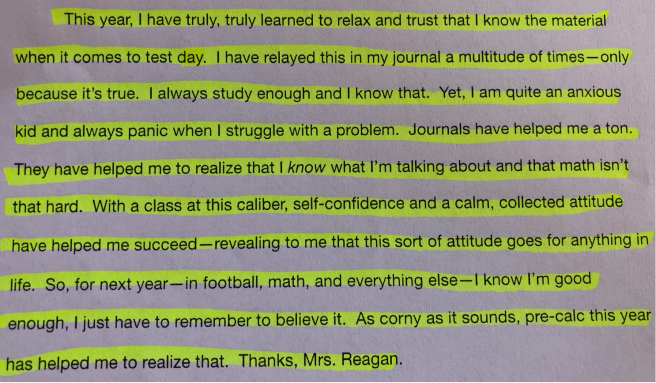I’ve taught AP Stats for 12 years. My students have always done well on the exam and write me notes from college letting me know how well they are doing in their stats classes and how well-prepared they felt. And, you would think I should feel great about that – but I didn’t.
About 5 years ago, I had 100% of my students pass the AP exam, and I was miserable at the end of the year. I hated the way I was teaching – lecture, drill, and kill. My students were doing great regurgitating the material – but I really didn’t get the sense that they were understanding at a deep level, nor did I feel like I had a way of measuring that potential knowledge (or lack thereof).
That summer (2014), I went to the Anya S. Greer Mathematics Conference at Phillips Exeter Academy. I attended the week-long session taught by Floyd Bullard (from North Carolina School of Science and Math) on Lab-Based Statistics – and it was an awakening. As we were working through some of the labs, I felt like I understood some of the concepts better and deeper – and if this is how I felt, how much more would my students?
So I brought his labs back to my classroom, I researched others, I used ideas from the AP Stats forum on the College Board page, I started following some stats folks on Twitter and incorporating some of their ideas, plus I got brave and I made my own labs. I took all of this and I made my own curriculum (I used the textbook, the labs, and a lecture hybrid). And things were … good. Better, for sure – but still just … good.
At the end of the 2017-2018 school year, I realized my stats students were annually deficient in 3 areas: 1) Reading and understanding the textbook/technical writing; 2) Keeping track of the large amount of vocab and definitions; 3) Reflection to develop and incorporate deeper understanding and foster metacognition.
That summer, at Twitter Math Camp, I attended the session taught by Bob Lochel (@bobloch) and Glenn Waddell (@gwaddellnvhs) on “Embrace Variability: ‘Big Ideas’ in Statistical Understanding.” Bob and Glenn encouraged us to follow a philosophy that I had seen others, like Luke Wilcox (@wilcoxl22) and Lindsey Gallas (@MrsGallasMath) and their Stats Medic (@TheStatsMedic) curriculum, use: Experience First, Formalize Later. I loved this idea – this was how I taught all my other classes, why not AP Stats too?
So, I blew the whole damn thing up.
My main goals were to keep the integrity of my students’ learning, focus on the idea of “Experience First, Formalize Later”, and address the 3 areas of deficiency. NBD, right?
Integrity of Student Learning: I teach with the belief that all my students are capable of learning and will never apologize for holding them to a high standard. I will also knock myself out to make myself available to help them. All assessments have both Multiple Choice and FRQ sections, and the FRQs come straight from prior AP exams. The FRQs are graded according to the AP rubrics and grading scale. This does lead to some pretty shockingly low scores for some of them initially. However, on every assessment, they are allowed to do corrections to earn back 1/2 the points they missed. Their initial score is rough, but the points back from the corrections ends up giving them a very fair grade. More about the corrections below.
Focus on the Idea of “Experience First, Formalize Later”: Using the Stats Medic curriculum as a backbone, I took their idea for templates and ran with it. I took all the labs I had used before, added a bunch, and created templates for everything. Now, we had labs for every topics, templates to refer back to, PLUS – each template had a reflective re-cap element (more about that below). Obviously, with a discipline like statistics, there has to be some explanation, some teacher guided discussion, some textbook reading – but that was now occurring after the experience of the lab.
Address the 3 Annual Areas of Deficiency: First, the issue of reading the textbook and understanding technical writing. I used to assign my students sections from the book to read, then problems from the back of each section, then collect those to make sure they had read the section. Borrrrrinngggg! And ineffective, and promotes cheating. Bleh. This year, I gave each student a composition notebook and when a section from the book was assigned, I asked them to answer the following prompt:
Before each assessment, I would ask the students to look back to their notebook and see if we needed to talk about #3, 4, and 6. This led to some great discussions. It also helped the students learn to read technical writing more carefully. When the students were taking their chapter tests, they would put their composition notebooks on their tables. As they worked on their tests, I would walk around and look at their notebooks. They received a grade each chapter for effort and completion. (I am open to any ideas on how to make this better; don’t hesitate to share!)
To help the students keep track of the large amount of vocabulary and definitions, I created a Google Sheet template. Each student used that to create their own guide that they shared with me. At the end of each chapter, I could just look at their sheet and give them a grade for effort and completion. When we finished with all materials and reviewing, I printed out their lists for each of them – their own, self-created review guide. Here is an example from one of my students:
Finally, how to add reflection to develop and incorporate deeper understanding and foster metacognition. I tried to be as deliberate and organic as I could with incorporating reflection. But reflection had to be/should be a part of everything we do in the class. As I mentioned previously, I added reflective elements to each template. Notice #3 and #6 in the Book Summary prompts – for sure appropriate and natural in that context, but also building a pattern of reflection that can be looked back at to determine patterns and foster/build metacognition.
With correction on assessment, students must meet with me to discuss what they missed. Then, they need to answer the following:
At the start of the year, I need to help students understand the “reflection” part. I do this when I meet with them to go over their errors. After I am sure the student understands the concept, I will ask the student – very deliberately – to explain to me what they did wrong, why they were wrong, if they could go back in time and change how they prepared for this assessment what would they do, etc. I sometimes need to push/prompt their thoughts as they are explaining their thoughts out loud. Then, I tell them – that’s a reflection! I encourage them to think about having a conversation with me as their reflection. That often helps students be able to go deeper and more personal.
Finally, at the end of each quarter, I have my students so a Reflection/Self-Evaluation. Students need to answer the following questions: Based on a rubric (that I stole from Carmel Schettino (@SchettinoPBL) – the metacognition guru):
Based on a rubric (that I stole from Carmel Schettino (@SchettinoPBL) – the metacognition guru):
The students do this in a Google Doc and share it with me. Throughout the next quarter, I encourage them to go back and review the goals that they set for themselves and challenge them with the question: “Are you meeting your goals? If not, what are you going to do about that?”
Here is an example of a student’s reflection on the first question:
Now, I’m at the end of the 2018-2019 school year and reflecting back. Blowing up an AP class and starting over was an incredible amount of work, but so, so worth it. I think my students, not only mastered the curriculum, but did so with a depth of understanding and level of metacognition none of my classes have had previously. Plus – it was so much more fun! For them, and me.
Bottom line: I don’t have this all figured out. I am still a student myself. However, I trust my gut and my students to let me know when I’m on the right path – and I feel like I’ve finally found it.










 Based on a rubric (that I stole from Carmel Schettino (@SchettinoPBL) – the metacognition guru):
Based on a rubric (that I stole from Carmel Schettino (@SchettinoPBL) – the metacognition guru):












